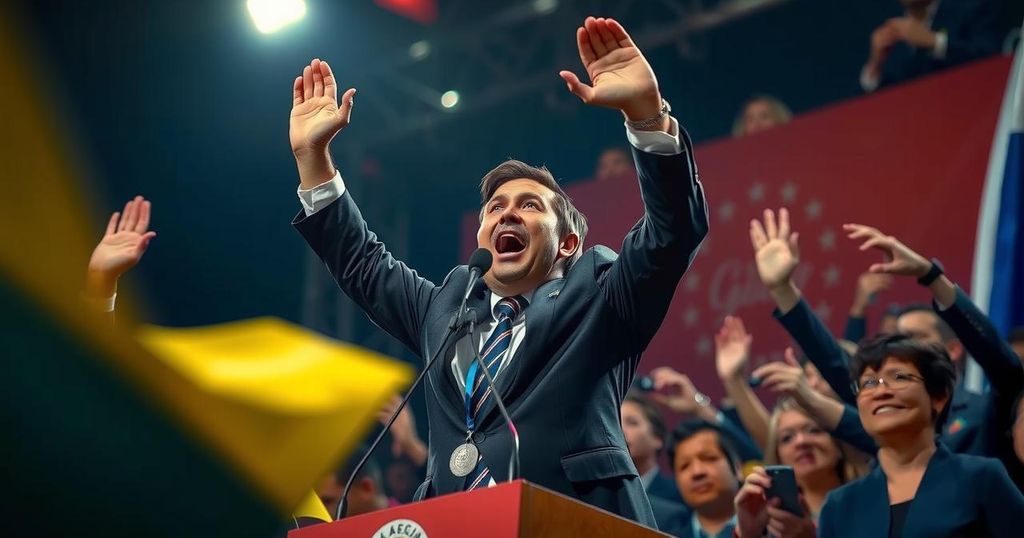Yamandú Orsi Wins Presidential Election, Signaling Change in Uruguay

Yamandú Orsi, a leftist candidate from the Broad Front coalition, secured a narrow victory over Álvaro Delgado in the recent presidential runoff in Uruguay. With over 49% of the votes, Orsi’s win reflects escalating public dissatisfaction with existing governance amid persistent economic challenges. His moderate reforms aim to unite Uruguay and attract investments, while his administration is set to begin in March 2025.
In a closely contested runoff election held on Sunday, leftist candidate Yamandú Orsi capitalized on widespread public dissatisfaction to secure his victory over the conservative ruling coalition in Uruguay. Orsi, a member of the Broad Front coalition and former history teacher with a background as a two-time mayor, garnered just over 49% of the votes, compared to 46% for Álvaro Delgado, the current government’s candidate. This election outcome reflects a broader wave of anti-incumbent sentiment observed in various regions worldwide.
The official announcement of Orsi’s win was met with jubilance in the capital, Montevideo, where supporters celebrated with fireworks. In his victory speech, Orsi reiterated the need for unity among Uruguay’s citizens, acknowledging the narrow margin of his win. “There are others in the country who feel differently today. We will need their help to build a better Uruguay,” he stated. Voter turnout was notably high, reaching 90%, as compulsory voting regulations remain in effect.
Despite challenges, such as dwindling interest from younger voters, Orsi’s moderate campaign approach sharply contrasted with the populist movements seen in neighboring countries. His victory signifies shifting political dynamics in Uruguay, as the electorate seeks solutions to pressing post-pandemic economic issues. While Orsi’s platform is not radical, it promises market-friendly reforms alongside social welfare programs, which were hallmarks of the Broad Front’s governance from 2005 to 2020. Under this previous administration’s leadership, Uruguay witnessed significant progressive reforms and economic stability.
President-elect Orsi’s proposed reforms include tax incentives aimed at attracting investments, revitalization of the agricultural sector, and adjustments to the social security system, although these do not encompass the extensive union demands previously rejected. Furthermore, the new administration may reconsider a contentious trade agreement with China amid internal Mercosur bloc tensions.
Notably, José Mujica, a former leader and key figure in the Broad Front, expressed his support for Orsi, affirming the historical significance of the election outcome. Meanwhile, Delgado, who campaigned on the continuation of current pro-business policies, conceded and acknowledged the efforts made during his tenure. In his concession, Delgado remarked, “With sadness, but without guilt, we can congratulate the winner.”
As Orsi prepares to assume the presidency on March 1, 2025, he conveys an intention to foster dialogue and collaboration across political divides. This development in Uruguay’s politics is underscored by a palpable desire for progressive change amid global economic challenges.
The election result is contextualized within a year marked by transformative political shifts in multiple countries, reflecting a growing tendency for voters to express discontent with incumbent parties and policies. The post-pandemic recovery phase has been particularly harsh, prompting electorates to seek more responsive governance. Moreover, Uruguay’s historical backdrop of progressive reforms under the Broad Front coalition lays the groundwork for Orsi’s leadership, positioning him as a candidate who can resonate with a diverse electorate facing economic adversities.
Yamandú Orsi’s victory in the presidential runoff illustrates profound electoral shifts in Uruguay, signifying a renewed demand for political change. His election marks a critical juncture for the Broad Front, promising to address pressing economic issues through a blend of moderate reforms that balance market interests with social welfare. As the nation looks towards March 2025, there lies an expectation for Orsi to navigate complex political landscapes while fostering a spirit of collaboration and inclusivity among diverse constituents.
Original Source: indianexpress.com







